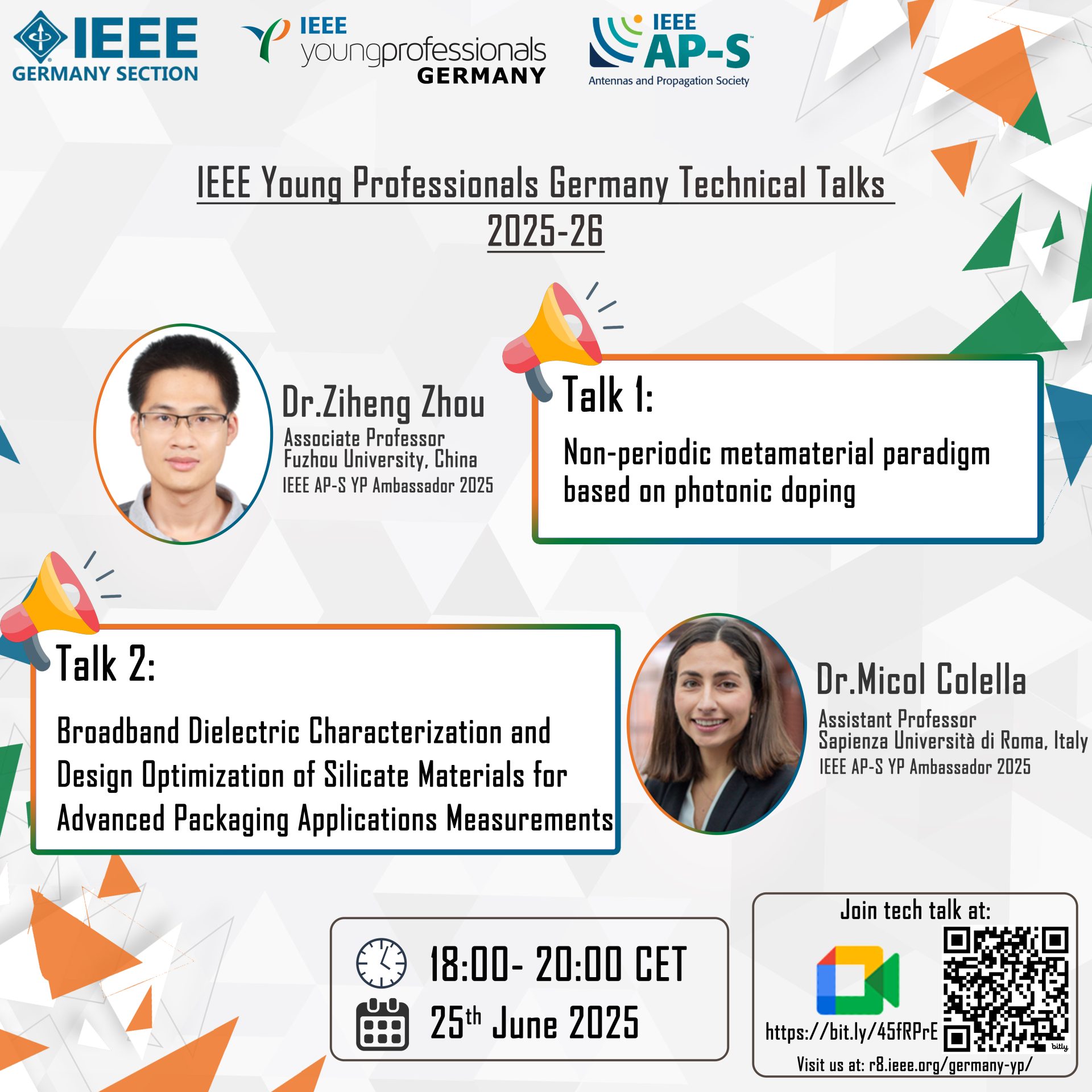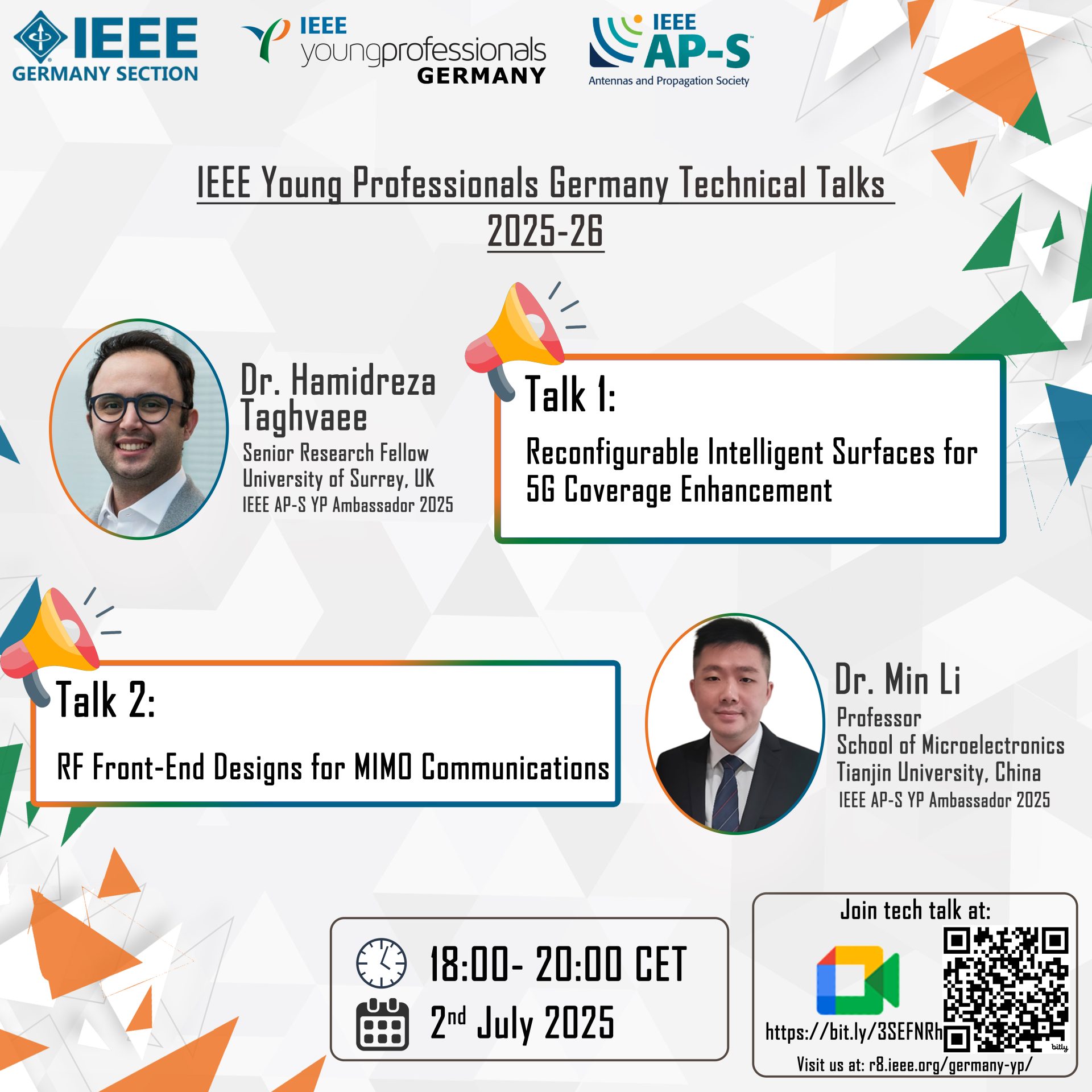Events
-
-
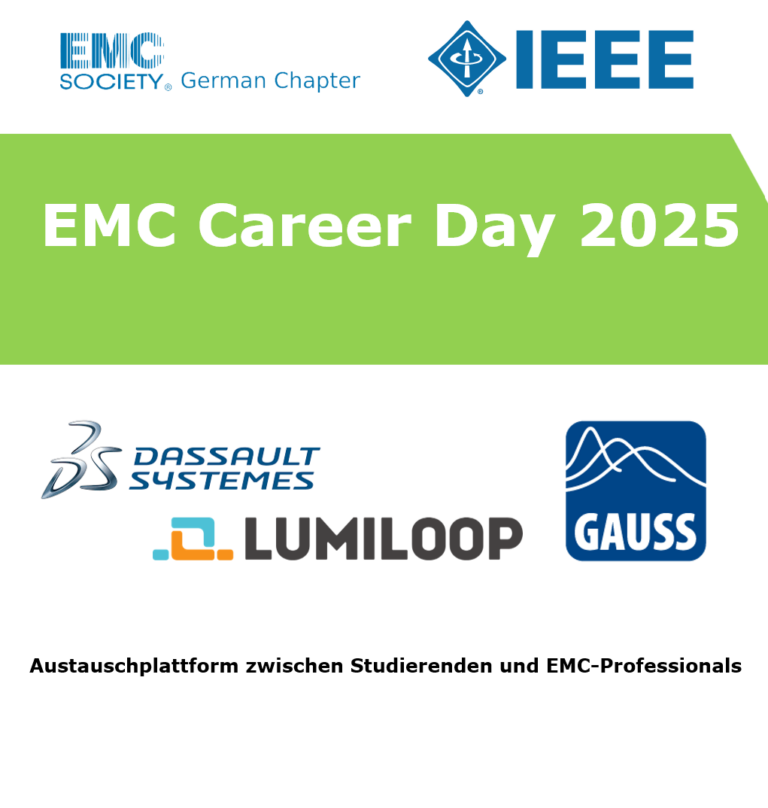
EMC Career Day 2025
Austauschplattform zwischen Studierenden und EMC-Professionals 21.05.2025 Event Details
-

How to find a topic for your thesis
Struggling to find the right topic for your thesis? We've got you covered! We are pleased to invite you to the upcoming IEEE Xplore webinar, titled 'How to find a topic for your thesis', which will take place on: 🗓 28 May 2025 🕐 13:00 – 14:00 CEST 📍 Online The webinar will introduce students to effective strategies for identifying a suitable thesis topic using the IEEE Xplore digital library, supporting them in the early stages of their academic research. The event is open to all students, including non-members of IEEE. Register here: https://ieee.webex.com/weblink/register/r5b34fb945850207330bde2efac7c1fb7
-
-

7th of Global Power, Energy and Communication Conference
Bochum , GermanyIEEE GPECOM 2025 is the 7th of Global Power, Energy and Communication Conference that focuses on the latest technologies, researches and challenges of power electronics, energy systems and communication technologies. The conference will be held on June 11-13, 2025 in Bochum / GERMANY. The purpose of IEEE GPECOM 2025 is to provide opportunity to share the most recent research outcomes in the areas of Power Electronics, Electrical Machines and Drives, Power Generation, Transmission and Distribution, Conventional and Renewable Energy Systems, recent technologies of Microgrids and Smart Grids, Communication Systems and Technologies. It is aimed to create a professional network among researchers, academicians, professionals, engineers, and industry on the focused and related research areas of the entire energy infrastructure. Submissions of power, energy, and communication systems research papers presenting the control, modeling, design, integration and applications in technical track (TT) fields. Regular Sessions The technical topics of the regular sessions include but are not limited to the following topics: TT1- Power Electronics, Power Converters, Devices and Controllers TT2- Electrical Machines and Drives TT3- Conventional and Renewable Energy Technologies TT4- Smart Grid Researches and Applications TT5- Communication Technologies and Researches Special Sessions IEEE GPECOM2025 will include special sessions on highly specialized topic areas, reporting technical trends and breakthroughs within the scope of the conference. Special Sessions are organized at the initiative of one or more individuals, who must adhere to specific procedures published on the conference website. Paper Submission Prospective authors are invited to electronically submit full papers in English, 6 pages, in pdf format following instructions accessible via www.gpecom.org/2025 The paper submission system is Microcoft CMT and can be accessed at; https://cmt3.research.microsoft.com/GPECOM2025 Awards GPECOM 2025 Awards will be presented in categories of - GPECOM2025 Best Student Paper Awards - GPECOM2025 Outstanding Paper Awards - GPECOM2025 Best Presentation Awards Venue IEEE GPECOM2025 will be held in Bochum, Germany. The online sessions will be held with MS Teams. DeadHnes Special Session and Tutorial Proposal: February 16, 2025 Full Paper Submission: March 30, 2025 Notification of Acceptance: April 27, 2025 Final Paper Submission: May 16, 2025 The full CfP as pdf: CfP_GPECOM2025_v2_
-

IEEE Milestone: Verleihung in der Gallusanlage in Frankfurt a.M.
Am 25. August 1891 wurde die erste Fernübertragung mit Drehstrom in Betrieb gesetzt. Diese große technischen Leistung wird als IEEE Milestones ausgezeichnet und in Form einer Ehrentafel in der Gallusanlage geehrt. Mehr...
-
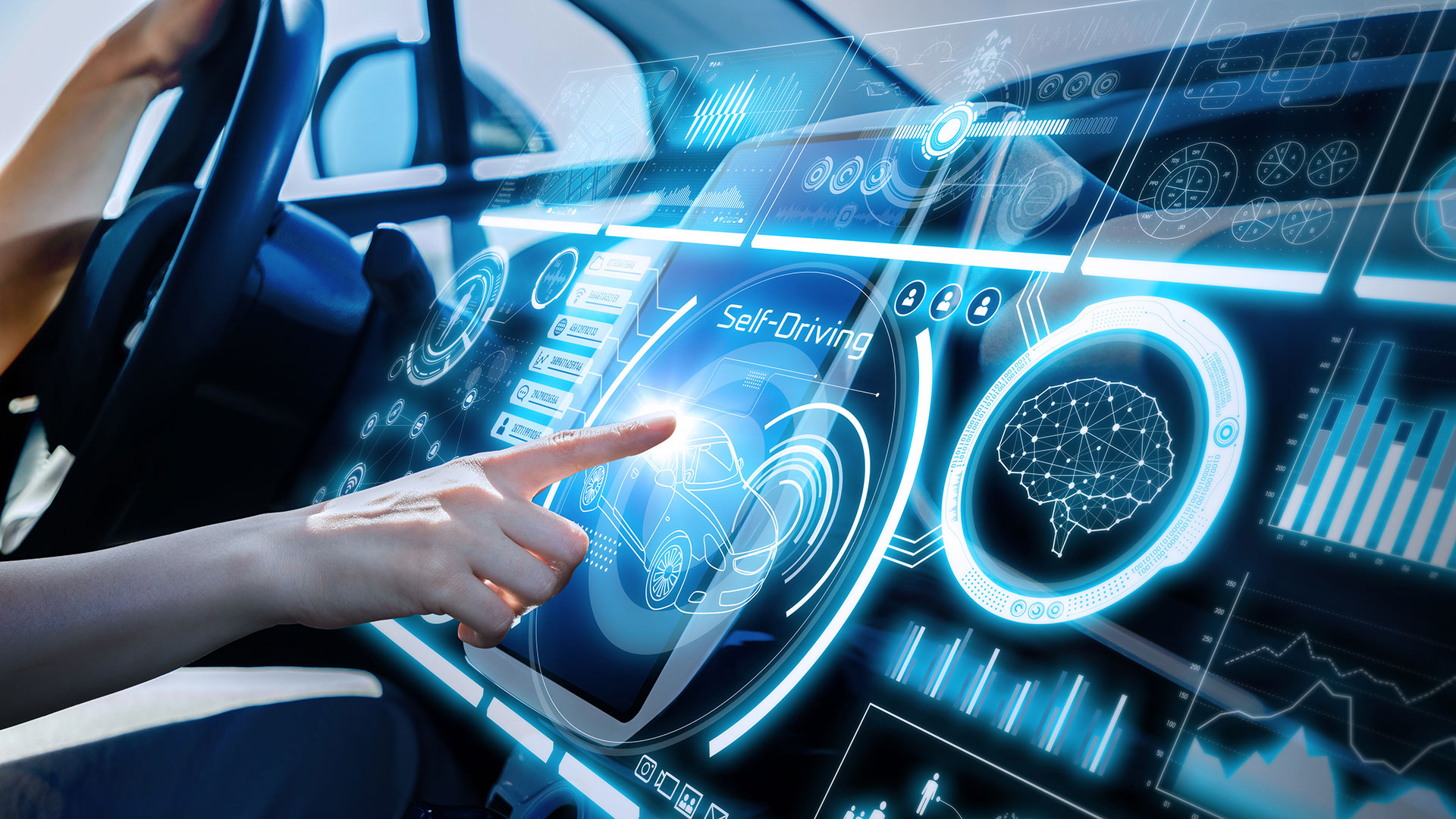
2025 IEEE Pulsed Power & Plasma Science (PPPS)
Berlin , Germany2025 IEEE Pulsed Power & Plasma Science (PPPS) wird in Berlin vom 2025-06-15 bis 2025-06-20 stattfinden. Die IEEE Nuclear and Plasma Sciences Society ist ein Sponsor dieser Veranstaltung. 2025 IEEE Pulsed Power & Plasma Science (PPPS) is scheduled to be held in Berlin on 2025-06-15 to 2025-06-20. The IEEE Nuclear and Plasma Sciences Society is a sponsor of this event
-
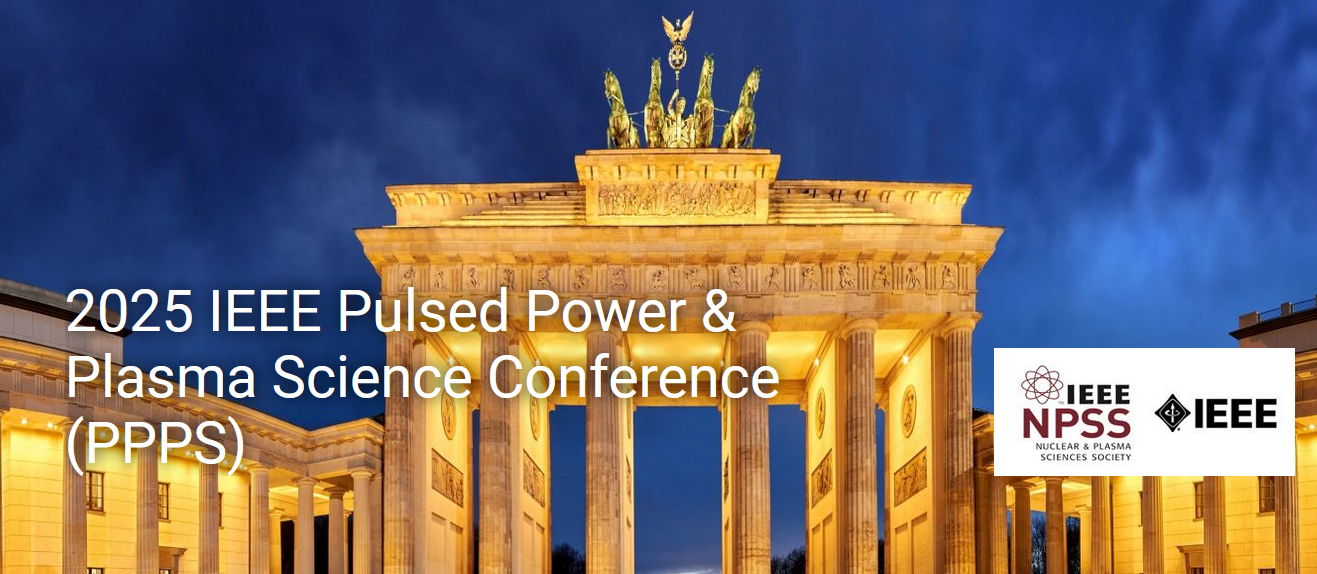
2025 IEEE Pulsed Power & Plasma Science Conference (PPPS)
Berlin , Germany2025 IEEE Pulsed Power & Plasma Science (PPPS) is scheduled to be held in Berlin on June 15th - 20th, 2025 General Chair Technical Chairs Georg Müller (Karlsruhe Institute of Technology) Tom Huiskamp - PPC Topics (Eindhoven University of Technology) Vice Chair Simon Bland - ICOPS-Topics (Imperial College London) John Jelonnek (Karlsruhe Institute of Technology) Financial Chair Wolfgang Frey (Karlsruhe Institute of Technology) Website: https://www.ppps2025.kit.edu/
-
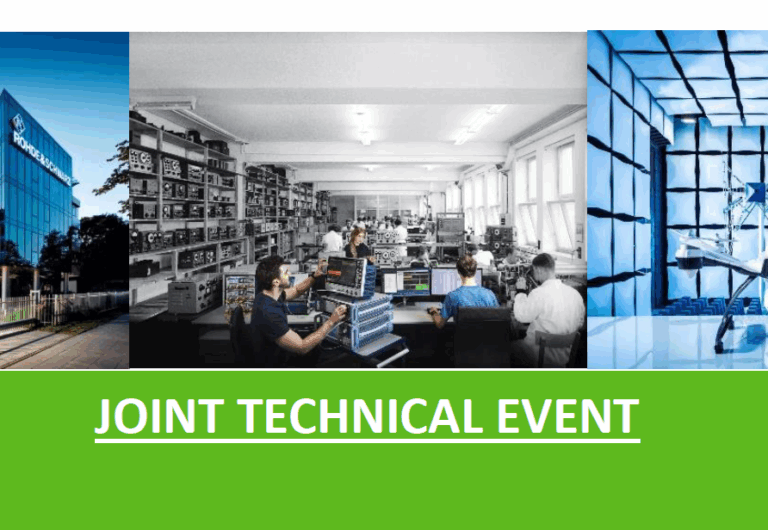
JOINT TECHNICAL EVENT
EMC talks by Dr. Derat and Mr. Cecca & EMI workshop by Mr. Hill Hosted by IEEE EMC Society German Chapter and Rohde & Schwarz 25.06.2025, 13:00 – 18:00 CEST Event Details
-
-
-
-
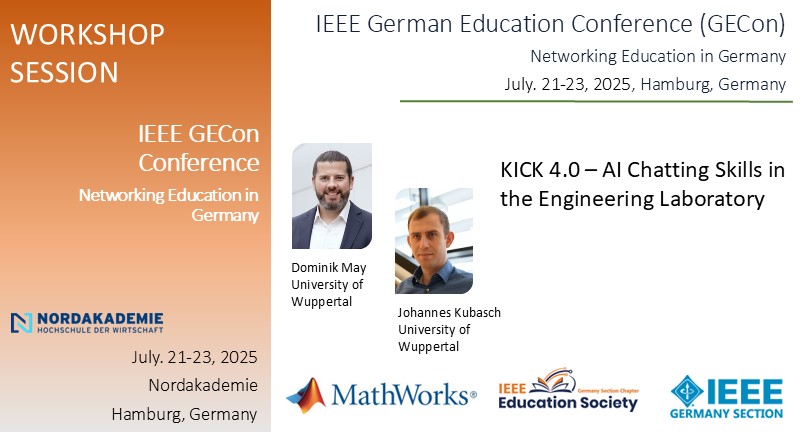
GECon 2025 Workshop: KICK 4.0 – AI Chatting Skills in the Engineering Laboratory
Hamburg , GermanyGECon 2025: Workshop Announcement KICK 4.0 – AI Chatting Skills in the Engineering Laboratory Join us for an interactive workshop exploring how generative AI tools like ChatGPT can transform student learning in engineering labs. Based on the interdisciplinary project KICK 4.0, this session introduces pedagogical strategies to help students critically and effectively collaborate with AI systems while solving real-world problems in fluid mechanics. 👨🏫 Led by: Johannes Kubasch, University of Wuppertal Prof. Dr.-Ing. Dominik May, University of Wuppertal 👥 Who should attend? Educators and researchers in engineering and STEM education, interested in leveraging AI to foster collaborative, agile, and self-directed learning in lab settings. 🛠️ Workshop Structure: Project introduction and theoretical background Group discussions on pedagogical, organizational, and technical aspects Development of initial guidelines for AI integration in engineering education This workshop is part of a two-year collaboration between TU Dortmund University and University of Wuppertal, supported by the Stiftung Innovation in der Hochschullehre (Germany). Let’s shape the future of engineering education—together! Follow our posts on our webpage: https://attend.ieee.org/gecon-2025/ Linkedin: https://www.linkedin.com/company/ieee-german-education-conference-gecon/?viewAsMember=true
-
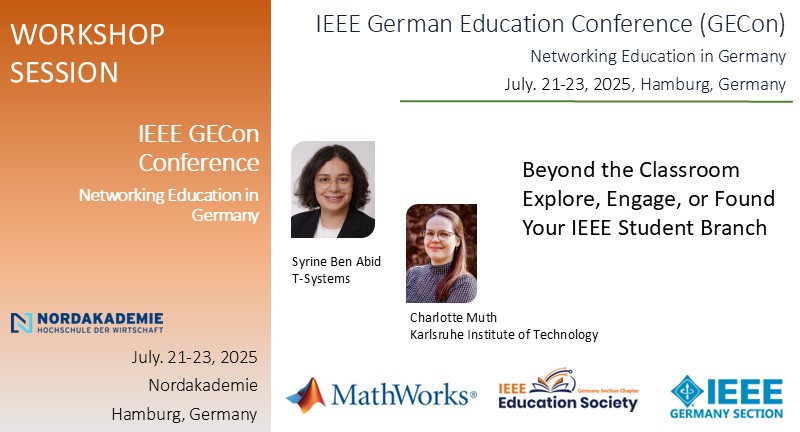
GECon 2005 Workshop: Beyond the Classroom: Explore, Engage, or Found Your IEEE Student Branch
Hamburg , Germany🎓 GECon 2005: Workshop Announcement Beyond the Classroom: Explore, Engage, or Found Your IEEE Student Branch Are you a student or educator passionate about empowering students to go beyond textbooks and lectures? This workshop introduces the world of IEEE Student Branches—student-led hubs that foster innovation, collaboration, and leadership in engineering and technology. 🚀 What to Expect: Discover the benefits of starting or joining a Student Branch Learn how to found and sustain a branch, with real-world strategies Explore inspiring student-led projects and success stories from across IEEE 🎤 Facilitators: Syrine Ben Abid, ML Engineering Consultant at T-Systems and founding Chair of the IEEE TU Darmstadt Student Branch Charlotte Muth, Ph.D. candidate at KIT and executive committee member of the IEEE Student Branch at Karlsruhe Whether you're looking to launch a branch or energize an existing one, this session offers practical insights and motivation to help you make it happen. Join us and discover how Student Branches can transform your academic journey and professional future. Follow our posts on our webpage: https://attend.ieee.org/gecon-2025/ Linkedin: https://www.linkedin.com/company/ieee-german-education-conference-gecon/?viewAsMember=true
-
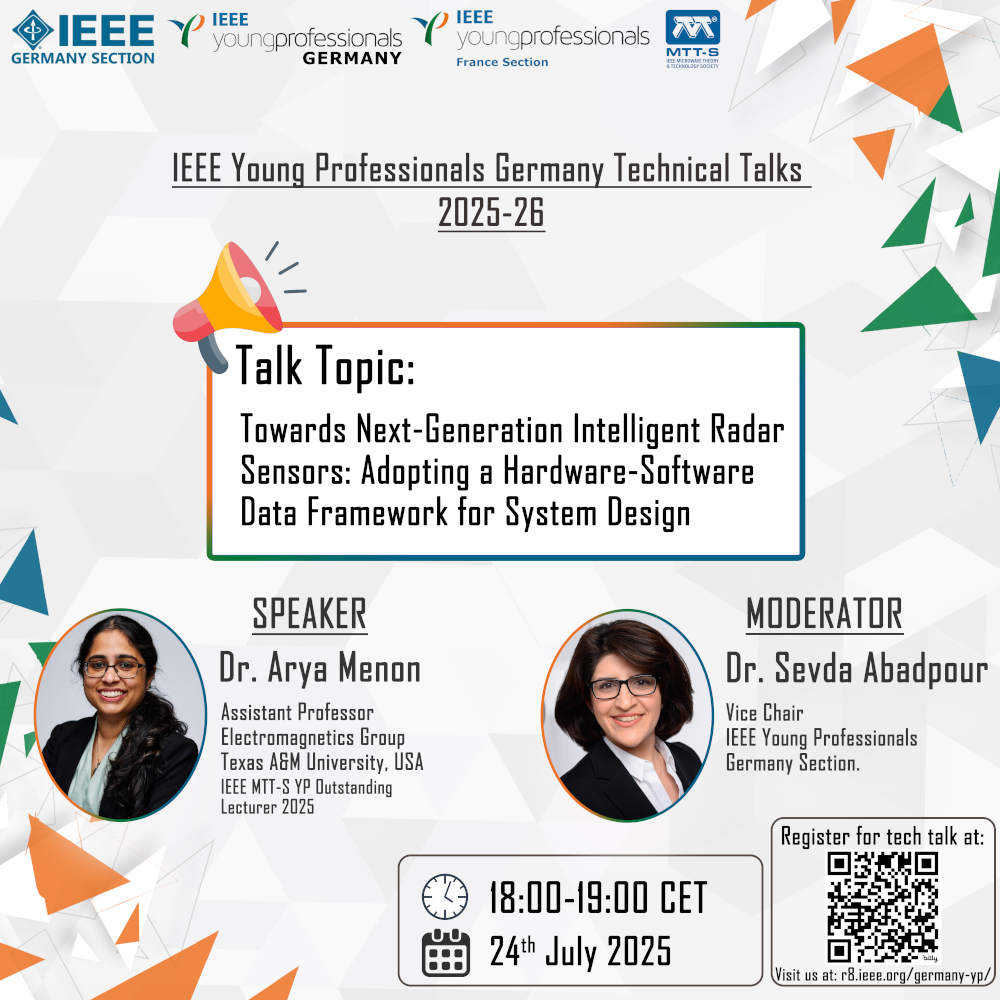
Towards Next-Generation Intelligent Radar Sensors: Adopting a Hardware-Software Data Framework for System Design
Speaker: Dr. Arya Menon Assistant Professor at the Electromagnetics Group of Texas A&M University, USA IEEE MTT-S YP Outstanding Lecturer 2025 Title of Talk: Towards Next-Generation Intelligent Radar Sensors: Adopting a Hardware-Software Data Framework for System Design When: 24th July 2025 at 6:00 pm CET Where: G-Meet, receiving the link by registration at https://www.eventbrite.com/e/ieee-yp-webinar-dr-arya-menon-tickets-1467820573849?utm-campaign=social&utm-content=attendeeshare&utm-medium=discovery&utm-term=listing&utm-source=cp&aff=ebdsshcopyurl

